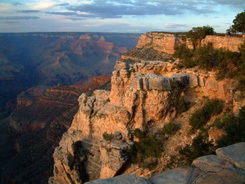
- Capital City:
- Phoenix
- Nickname:
- Grand Canyon State
- Motto:
- Ditat Deus (God enriches)
- Statehood:
- February 14, 1912 (48th)
- Origin of State's Name:
- Spanish interpretation of "arizuma," an Aztec Indian word meaning "silver-bearing." Also based on Pima Indian word "arizonac" for "little spring place."
- Largest Cities:
- Phoenix, Tucson, Mesa, Glendale, Scottsdale
- Border States:
- California, Colorado, Nevada, New Mexico, Utah
- Land Area:
- 113,642 sq. mi., 6th largest
- State Bird:
- Cactus Wren
- State Flower:
- Saguaro cactus blossom (carnegiea gigantea)
- State Tree:
- Palo verde (cercidium)
- State Song:
- Arizona
The "Grand Canyon State," Arizona, was the 48th state to join the U.S. in 1912-- the last of 48 contiguous (connected) states to join the Union. The state's name comes from arizonac, from two Papago Indian words meaning "place of the young spring." Arizona has a very dry climate and is known for its cactus plants. In fact, the state flower is the saguaro cactus blossom.
Grand Canyon Mule Trail Rides

Would you like to take a trip into the Grand Canyon? Then, hold on to your horses -- or better yet, your mule. That's right, mule. Mules are well suited for traversing the Grand Canyon. They are three times as strong as a horse, more sure-footed, intelligent, and trainable. They are known for having a stubborn nature, but this is due to their strong sense of self-preservation.
Riding into the canyon, "is not a pony ride at Disneyland," according to Ron Clayton, manager of the Grand Canyon Mule Operation. He prepares people who want to take the trip for a tough, yet satisfying, experience. Riders have a choice of two separate trips leaving the South Rim of the Canyon: the first is a one-day ride down Bright Angel Trail to Plateau Point, where the mule riders can look out over the Colorado River. The second is an overnight ride that ends at Phantom Ranch, where riders can spend one or two nights exploring the bottom of the Canyon. Are you ready to saddle up?
The Annual Waila Festival
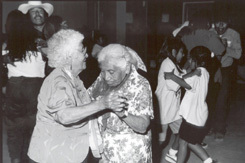
Would you ever guess that 'waila' was a kind of social dance music? Also known as "chicken scratch" music, waila music is featured at the Annual Waila Festival in Tucson.
Waila music comes from the Tohono O'odham, the native people of the Sonoran desert and the largest Indian tribe of southern Arizona. Waila (pronounced why-la) is an O'odham word that comes from the Spanish word "baile," which means "to dance." There are no words to waila music -- it is only instrumental, and is played on a button accordion, alto saxophone, electric six-string and bass guitars, and drums.
Waila began from the music of early fiddle bands that adapted European and Mexican tunes heard in northern Sonora. The dances performed in the waila tradition are the waila (which is similar to a polka), the chote (based on a folk dance from Scotland or Germany), and the mazurka (based on a Polish folk dance). Regardless of the beat, all waila dances are performed while moving around the floor in a counterclockwise direction.
Arizona Book Festival
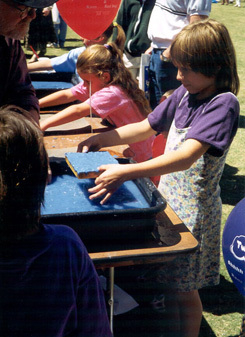
What do you need to have a book festival? Authors, readers, and, of course, books! One component of books is paper, and in this photo you can see kids at the Arizona Book Festival, learning how to make paper.
The Arizona Book Festival started in 1998 when the Arizona Humanities Council decided to feature the many good writers from the South and West and to sponsor book-related events that take place in libraries, bookstores, community centers, and other educational and cultural spaces. The authors invited to the Arizona Book Festival represent different cultures, literary styles, and subject matter.
Barbara Kingsolver is one of the authors from the Southwest who is honored at the festival. Born in Kentucky, Kingsolver moved to Arizona, and her first novel, The Bean Trees, is about a young woman who leaves rural Kentucky and finds herself living in Tucson, Arizona. Many of her other novels also take place in Kentucky and Arizona.
Other events at the festival include characters from books, who make special appearances, like Clifford the Big Red Dog.
Gold Rush Days in Wickenburg, Arizona
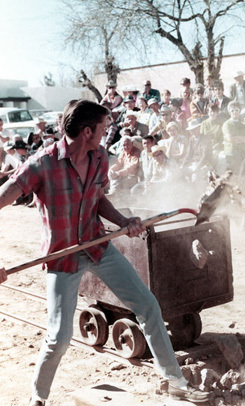
How would you like to strike gold? There is a gold rush going on in Wickenburg, Arizona. You just have to get in and muck about! Every year, the Wickenburg Chamber of Commerce sponsors a festival to celebrate the town's mining and ranching heritage, and participants get to shovel and pan for gold!
Wherever gold is discovered, there is usually a large rush of people who are hoping to get rich quick, which is why it is called a "gold rush." When Henry Wickenburg, an adventurer, discovered gold along the Hassayampa River in 1863, it caused a gold rush, and the town was founded.
In 1948, the Wickenburg Chamber of Commerce decided to hold a festival in honor of this discovery. Contests include a drilling and mucking contest and a gold-panning contest. Drilling and mucking is the way that gold is taken from the ground. A mucker is a machine that gets the rock out of the ground and moves broken rock onto a conveyor belt. A hand mucker is a man who shovels ore and unwanted rock out of a mine. Gold panning is the way in which gold dust and flecks are removed from streams and rivers. It takes a lot of work to strike gold!
Hashknife Pony Express
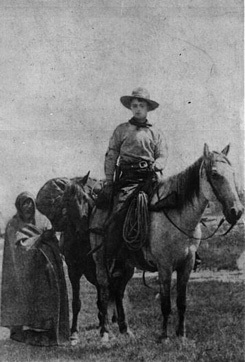
If you thought the pony express was a thing of the past, think again. Did you know you can still have mail delivered by horses?
Arizona has the only pony express that still delivers mail for the U.S. Postal Service. The Hashknife Pony Express makes its ride every January during the Parada del Sol festival, traveling 200 miles from Holbrook, Arizona, to Scottsdale, Arizona, and delivering 20,000 first-class letters by horseback. The ride is led by the Navajo County Hashknife Sheriff's Posse, which was organized as a search-and-rescue group in 1955. More than two dozen riders in authentic cowboy clothing carry the mail, relaying the bags along the route. As the word has spread about the ride, public participation has increased, with many letters arriving in the Holbrook Post Office the week before the ride, marked "via Pony Express." Each letter is stamped with a special mark, or cachet. The arrival of the Hashknife Pony Express in Scottsdale kicks off the annual Parada del Sol.
 Print
Print Email
Email







